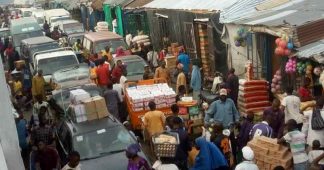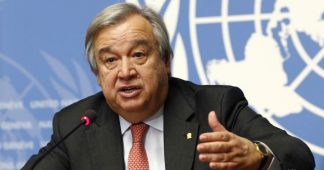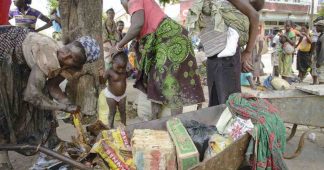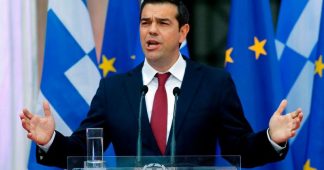West told to ensure that no country faces choice between paying for pandemic response and making loan repayments
By Ceren Sagir
CAMPAIGNERS and trade unions urged the government to cancel debt repayments for the world’s poorest countries today as they struggle to cope with the coronavirus crisis.
The call came at the start of the International Monetary Fund (IMF) and World Bank virtual meeting today, in which world leaders are considering assistance for impoverished nations in their response to the pandemic.
Campaigners called for sweeping debt cancellation to help developing countries, demanding a write-down of over $40 billion (£31.7bn) from wealthy governments, international institutions and banks.
The IMF has announced a fund of $500 million (£396m), which campaigners described as a “drop in the ocean” while criticising the organisation for failing to draw on its own vast resources to help out.
Global Justice Now director Nick Dearden said that while Britain’s 4,000 intensive-care beds at the start of the coronavirus crisis were considered not nearly enough, Kenya — with a population of over 50 million people — only had 130.
Mali has 19 million people but only 20 ventilators, he said.
“These countries need to unleash massive spending to deal with the health and economic crisis, just as our own governments have,” Mr Dearden said.
“But with debt payments costing the most vulnerable of these countries as much as $40bn this year, they simply can’t do it unless this burden is lifted.
“We appreciate that both the IMF and Britain have made money available for debt relief. But to date a fairly paltry sum is on the table.
“The IMF has massive reserves it needs to bring into play this week to allow sweeping debt cancellation.”
Mr Dearden urged countries such as Britain to demand that banks and the private sector write down debts.
“It would be obscene if these debts continue to be sold and speculated on in financial centres like London when impoverished countries are unable to provide the basics to contain this disease,” he said.
“In this crisis, we are only as safe as the poorest countries in the world. Institutions like the IMF need to massively scale up their funding for debt cancellation to defeat this outbreak. The measures so far are a drop in the ocean.”
Labour’s shadow international development secretary Preet Kaur Gill said: “Although the virus is indiscriminate in its reach, it is the poorest and most vulnerable who will be hit hardest, and we risk seeing half a billion people pushed into poverty globally.”
She said it is unacceptable that some of the poorest countries are being expected to prioritise debt repayments over the safety of their citizens.
“This is a global emergency, and if we can ensure the most vulnerable people are protected overseas, it will help us to quickly tackle this crisis,” she said. “In the long run this will also protect people and front-line services in the UK.”
Ms Kaur criticised the British government for being too quiet on the issue and too slow in driving “desperately needed” global co-operation. She urged the government to use its influence to push for the cancellation of debt repayments for low-income countries without conditions, freeing up billions of pounds to help the poorest nations invest in their health systems.
The world economy will suffer its worst year in 2020 since the Great Depression, the IMF said in its latest forecast, warning of a 3 per cent contraction before a predicted rebound in 2021.
But it cautioned that the predictions were shrouded in unknowns, such as the path the virus will take, the effectiveness of policies on containment and uncertainty over isolation periods.
It also noted that policy-makers in many countries have engineered “swift and sizeable” responses, but said that some nations cannot afford sufficiently aggressive rescue plans and may require external support.
TUC general secretary Frances O’Grady said that global co-operation to tackle Covid-19 is vital and warned that poorer countries need resources for health services and funds to shield people from the economic impact.
“No country should be forced to pay off debts instead of action to prevent the spread of Covid-19 and protect its citizens,” she said











